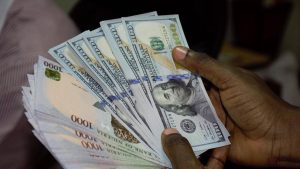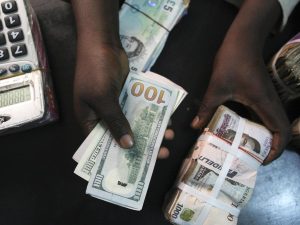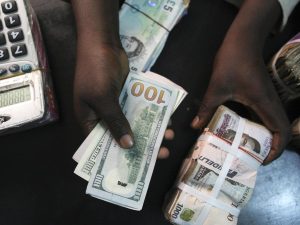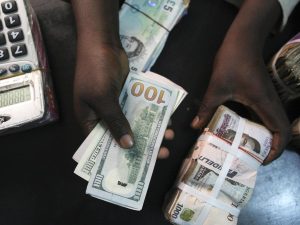Nigerian local currency, Naira, has witnessed a continued depreciation in the official market after closing the market on Friday, exchanging against the United States Dollar at ₦1,466.31.
According to the Nation Autonomous Foreign Exchange Market (NAFEM), the exchange rate between the dollar and naira saw an increase of ₦40 from Thursday to Friday, closing at ₦1,426 to a dollar.
Recent reports indicate that the naira’s previous gains against the dollar have been eroded. The exchange rate is now above ₦1000, causing concern for businesses and the government.
Following a series of reforms and interventions by the Central Bank of Nigeria (CBN) aimed at stabilizing the exchange rate market, the apex bank also increased the supply of dollars to Bureau De Change (BDC) operators to enhance liquidity in the market.
Yesterday, the dollar was traded at ₦1,466.31 at the official market, but it experienced further depreciation at the parallel market, where it was exchanged for ₦1,510.
Initially priced at ₦1,450 on Friday morning, the dollar closed the day at ₦1,510 at the street market, commonly known as the black market.
EFCC Bans US Dollar Transactions In Nigeria, Orders Embassies To Transact In Naira
Meanwhile, the Economic and Financial Crimes Commission (EFCC) has issued a strong warning to foreign missions operating in Nigeria, prohibiting them from conducting transactions in foreign currencies and requiring them to use the Naira for their financial activities, Naija News reports.
Furthermore, the EFCC has instructed Nigerian foreign missions located abroad to accept the Naira for their financial operations.
The EFCC said this decision becomes necessary to combat the dollarization of the Nigerian economy and the devaluation of the Naira.
In an advisory titled “EFCC Advisory to Foreign Missions against Invoicing in US Dollar,” sent to the Minister of Foreign Affairs, Ambassador Yusuf Tuggar, the anti-graft commission expressed its concerns and dissatisfaction with the practice of some foreign missions invoicing consular services to Nigerians and other foreign nationals in the country using the United States dollar.
In a letter dated April 5, 2024, addressed to the Minister of Foreign Affairs, the Chairman of the EFCC, Ola Olukoyede, expressed disappointment regarding the invoicing of consular services in Nigeria in dollars by foreign missions.
The EFCC referred to Section 20(1) of the Central Bank of Nigeria Act, 2007, which designates the currencies issued by the central bank as the only legal tender in Nigeria.
The letter read, “I present to you the compliments of the Economic and Financial Crimes Commission, and wish to notify you about the commission’s observation, with dismay, regarding the unhealthy practice by some foreign missions to invoice consular services to Nigerians and other foreign nationals in the country in United States dollar ($).
“This practice is an aberration and unlawful as it conflicts with extant laws and financial regulations in Nigeria. Section 20(1) of the Central Bank of Nigeria Act, 2007 makes currencies issued by the apex bank the only legal tender in Nigeria.
“It states that ‘the currency notes issued by the Bank shall be the legal tender in Nigeria on their face value for the payment of any amount’.
“This presupposes that any transaction in currencies other than the naira anywhere in Nigeria contravenes the law and is, therefore, illegal.
“In light of the above, you may wish to convey the commission’s displeasure to all missions in Nigeria and restate Nigeria’s desire for their operations not to conflict with extant laws and regulations in the country.”
The post Again, Naira Slumps Against US Dollar At Both Parallel And Official Markets appeared first on Naija News.






